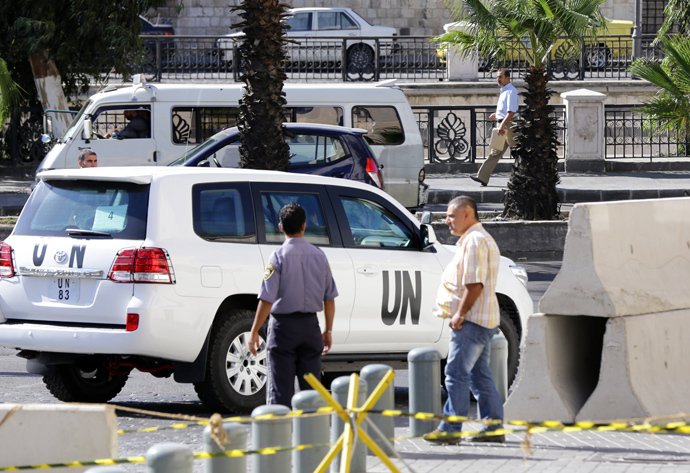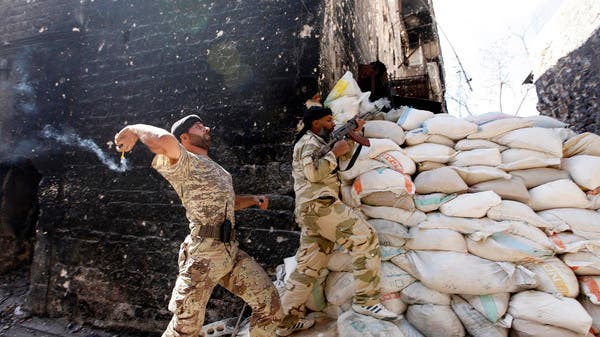http://rt.com/news/syria-sarin-saudi-provocation-736/
and......
http://rinf.com/alt-news/breaking-news/fsa-on-brink-of-collapse-in-syria/76002/
The August chemical weapons attack in the Syrian capital’s suburbs was done by a Saudi Arabian black operations team, Russian diplomatic sources have told a Russian news agency.
“Based on data from a number of sources a picture can be pieced together. The criminal provocation in Eastern Ghouta was done by a black op team that the Saudi’s sent through Jordan and which acted with support of the Liwa Al-Islam group,” a source in the diplomatic circles told Interfax.
The attack and its consequences had a huge impact on the Syrian situation, another source said.
“Syrians of various political views, including some opposition fighters, are seeking to inform diplomats and members of international organizations working in Syria what they know about the crime and the forces which inspired it,” he told the agency.
Liwa Al-Islam is an Islamist armed group operating near Damascus headed by the son of a Saudi-based Salafi cleric. The group claimed responsibility for the bombing of a secret governmental meeting in Damascus in July 2012 that killed a number of top Syrian officials, including Defense Minister Dawoud Rajiha, his deputy Asef Shawkat, and Assistant Vice President Hassan Turkmani.
The allegations mirror a number of earlier reports, which pointed to Saudi Arabia as the mastermind behind the sarin gas attack, which almost led to US military action against Syrian government. Proponents of this scenario say intelligence services in Riyadh needed a false flag operation to provoke an American attack in Syria, which would tip the balance in favor of the armed opposition supported by Saudi Arabia.
While the majority of Western countries say they are certain that the Syrian government carries the blame for the attack, Damascus maintains that the rebel forces must be behind it. Russia shares this conviction too, calling the incident a provocation.
Back in March US President Barack Obama said the use of chemical weapons would be a ‘red line’ for the Syrian government, crossing which would prompt America’s intervention into the bloody Syrian conflict. After the August attack, which the US believes has claimed some 1,400 lives, the president was called on his words by many supporters of the Syrian opposition both at home and outside of the US.
Earlier a UN report concluded that nerve gas had indeed been used “on a large scale” in August. However, the consistency of the findings is under question.
According to the report, none of the environmental samples the UN collected in Western Ghouta tested positive for Sarin, while biomedical samples, taken from affected people, all tested positive.
RT’s Worlds Apart host Oksana Boyko has spoken to Angela Kane, UN high representative for disarmament affairs, who has just returned from Damascus.
“If you read the report, the report comes out and says sarin was used. It is also a matter that maybe in the environmental samples they took there was no sarin found, but that does not mean that sarin was not used,” Kane told Worlds Apart. “It was there in the human samples. If they had more time to go around they would have found different samples. It was a limited collection that they did, but the collection was conclusive. I think, it was very comprehensive, therefore, we shared all of those samples with the Syrian government.”
At the same time, there have been concerns voiced that witnesses the UN team spoke to were brought by the opposition from different regions and did not live in Western Ghouta.
“I think it is not possible to say ‘We brought them all from a different area.’ To my mind that is inconceivable. You can come up with the theory, but this does not mean the theory is correct,” Kane said.
When asked if the UN team had requested examining dead bodies to take more samples, Kane said they had not, because “there was no need to exhume dead bodies” as victims’ accounts “are much more powerful.”
“Dead body can’t tell you anything. The dead body can’t tell how the person dies, how the person was affected, how the person suffered. A living person can tell you that,” Kane said.
After the UN team left Syria on Monday, Organization for the Prohibition of Chemical Weapons (OPCW) experts arrived in the country. They are currently making preparations for the disarmament.
The OPCW team will start conducting tests on October 7.
and.......
http://english.alarabiya.net/en/News/middle-east/2013/10/04/Assad-warns-Turkey-will-pay-have-price-for-backing-rebels.html
Last Update: Friday, 4 October 2013 KSA 19:28 - GMT 16:28
Assad warns Turkey will pay ‘heavy price’ for backing rebels
Ece Toksabay, Istanbul / Reuters
Syrian President Bashar al-Assad has told Turkey it will pay a heavy price for backing rebels fighting to oust him, accusing it of harboring “terrorists” along its border who would soon turn against their hosts.
In an interview with Turkey’s Halk TV due to be broadcast later on Friday, Assad called Turkish Prime Minister Tayyip Erdogan “bigoted” and said Ankara was allowing terrorists to cross into Syria to attack the army and Syrian civilians.
“It is not possible to put terrorism in your pocket and use it as a card because it is like a scorpion which won’t hesitate to sting you at the first opportunity,” Assad said, according to a transcript from Halk TV, which is close to Turkey’s opposition.
“In the near future, these terrorists will have an impact on Turkey and Turkey will pay a heavy price for it.”
Turkey, which shares a 900-km (560-mile) border with Syria and has NATO’s second largest deployable armed forces, is one of Assad’s fiercest critics and a staunch supporter of the opposition, although it denies arming the rebels.
It shelters about a quarter of the 2 million people who have fled Syria and has often seen the conflict spill across its frontier, responding in kind when mortars and shells fired from Syria have hit its soil.
It has also allowed rebel fighters to cross in and out of Syria but has grown alarmed, along with Western allies opposed to Assad, by divisions among their ranks and the deepening influence of radical Islamists in Syria.
Last month, the al-Qaeda-affiliated Islamic State of Iraq and the Levant seized Azaz, about 5 km (3 miles) from the border with Turkey, and has repeatedly clashed with the local Northern Storm brigade since then.
“Right now, Syria is headed for a sectarian war,” Erdogan said in an interview on Turkish television late on Thursday.
“This is the danger we are facing.”
Turkey has bolstered its defenses and sent additional troops to the border with Syria in recent weeks and its parliament voted on Thursday to extend by a year a mandate authorizing a military deployment to Syria if needed.
Undecided on elections
Assad accused Erdogan, whose AK Party has its roots in conservative Islamist politics, of a sectarian agenda.
“Before the crisis, Erdogan had never mentioned reforms or democracy, he was never interested in these issues... Erdogan only wanted the Muslim Brotherhood to return to Syria, that was his main and core aim,” he said.
Erdogan’s government strongly denies any such agenda.
His aides point to his cultivation of good relations with Assad for years before the conflict and say Turkey does not see Syria’s Sunni Muslims and its Alawite sect, an offshoot of Shi’ism to which Assad belongs, as fixed blocs.
Assad said he had not yet decided whether to run in presidential elections next year because the situation on the ground was changing rapidly, adding that he would only put himself forward if Syrians wanted him to. The picture will become clearer in the next 4-5 months, Assad said.
The United Nations estimates that more than 100,000 people have died since the uprising against Assad began in March 2011 and has been notified of at least 14 chemical attacks.
The U.N. Security Council adopted a resolution last week that demands the eradication of Syria’s chemical weapons and endorses a plan for a political transition in Syria agreed on at an international conference in Geneva last year.
U.N. Secretary-General Ban Ki-moon said after the vote that major powers hoped to hold a second peace conference on Syria in mid-November in Geneva.
In his interview, Assad again denied his forces had used chemical weapons and blamed such attacks on the rebels. Asked whether he expected the Geneva process to accelerate if Syria handed over its chemical weapons, Assad said he saw no link.
“Practically these issues are not related. Geneva II is about Syria’s own domestic political process and cutting neighboring countries’ weapons and financial support to terrorists,” he said.
http://rinf.com/alt-news/breaking-news/fsa-on-brink-of-collapse-in-syria/76002/
FSA ‘on brink of collapse’ in Syria
The so-called Free Syrian Army (FSA) is on the verge of collapse due to its deteriorating internal rifts, and the situation in Syria is further shifting in favor of the government, a political analyst tells Press TV.
œThe Free Syrian Army right now is in disarray and is collapsing,” said Lawrence Freeman in a Friday interview with Press TV.
œI think the situation is tilting right now against the Syrian Free Army and the opposition in favor of the government,” he said.
The analyst noted that, about six weeks ago, the representatives of different spectrums of the FSA met with the representatives of the Syrian government, during which they discussed a six-point plan aimed at resolving the crisis internally.
Over the past months, the Syrian army has managed to inflict major losses on anti-Damascus armed groups. The army has also conducted successful clean-up operations across the country.
On Thursday, Syrian troops regained full control of Khanasser, a strategic town in the northern Aleppo Province, which links central Syria to the province.
Syria has been gripped by deadly unrest since 2011. According to reports, the Western powers and their regional allies, especially Qatar, Saudi Arabia, and Turkey, are supporting the militants operating inside Syria to overthrow the government of Bashar al-Assad.
According to the United Nations, more than 100,000 people have been killed and millions displaced due to the violence.



No comments:
Post a Comment